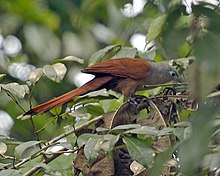Raffles's malkoha
| Raffles's malkoha | |
|---|---|

| |
| Scientific classification | |
| Domain: | Eukaryota |
| Kingdom: | Animalia |
| Phylum: | Chordata |
| Class: | Aves |
| Order: | Cuculiformes |
| Family: | Cuculidae |
| Genus: | Rhinortha Vigors, 1830 |
| Species: | R. chlorophaea
|
| Binomial name | |
| Rhinortha chlorophaea (Raffles, 1822)
| |
| Synonyms | |
|
Cuculus chlorophaeus Raffles, 1822 | |
Raffles's malkoha (Rhinortha chlorophaea) is a species of cuckoo (family Cuculidae). It was formerly often placed in Phaenicophaeus with the other malkohas, but it is a rather distinct species, with several autapomorphies and sexual dimorphism (which its presumed relatives all lack).
It might not even be very closely related to the true malkohas, but form a very basal lineage of cuckoos; in any case, its placement in a monotypic genus Rhinortha is well warranted.
It is found in Brunei, Indonesia, Malaysia, Myanmar, Singapore, and Thailand. Its natural habitat is subtropical or tropical moist lowland forests.
Its diet consists of insects, including caterpillars, cicadas, crickets, beetles, and locusts.[2]
During courtship, the male Raffles's malkoha has been observed to stand on the base of the female's outstretched wings and hold a frog in its bill. It is unclear whether the frog is a gift to the female or whether the male keeps it afterward.[2]
References
[edit]- ^ BirdLife International (2016). "Rhinortha chlorophaea". IUCN Red List of Threatened Species. 2016: e.T22684107A93014746. doi:10.2305/IUCN.UK.2016-3.RLTS.T22684107A93014746.en. Retrieved 17 November 2021.
- ^ a b Bhowmik, Deepshikha; Chetri, Shiela; Das, Bhaskar Jyoti; Dhar Chanda, Debadatta; Bhattacharjee, Amitabha (2021-02-10). "Distribution of virulence genes and SCCmec types among methicillin-resistant Staphylococcus aureus of clinical and environmental origin: a study from community of Assam, India". BMC Research Notes. 14 (1): 58. doi:10.1186/s13104-021-05473-3. ISSN 1756-0500. PMC 7876809. PMID 33568186.
- BirdLife International 2004. Phaenicophaeus chlorophaeus. 2006 IUCN Red List of Threatened Species. Downloaded on 24 July 2007.



